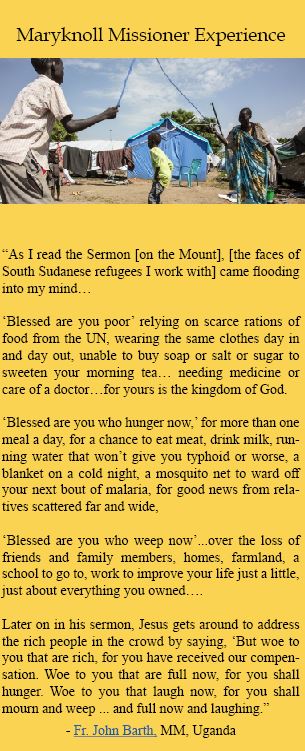Third Week of Lent: Loving God First
Reflect, pray, fast, and act with us for this Third Week of Lent.
From the Lenten Reflection Guide 2021: Brothers and Sisters All.
“Jesus went up to Jerusalem. He found in the temple area those who sold oxen, sheep, and doves, as well as the money changers seated there. He made a whip out of cords and drove them all out of the temple area…”
John 2: 13-15
For this third week of Lent, the Scripture readings center on the theme of God’s commandments and the sins of idolatry. In the first reading, the Israelites receive God’s ten commandments. In the Gospel from John, we hear the famous story of Jesus angrily removing the greedy merchants and money changers from the Temple.
St. Augustine famously called all sin “disordered love.” In the words of St. Augustine, God’s commandments teach us to “set our loves in order” so that our lives reflect what Jesus, echoing the prophets, named as the sum of the commandments: to love God above all things, and to love one’s neighbor as oneself.
Jesus’ actions in the Temple in today’s Gospel invite us to focus in on one “disordered love:” the love of money over the love of God and neighbor. We all have heard the commandment “thou shall not steal,” as well as Jesus’ sayings in the Sermon on the Mount, “One cannot serve [as Master] both God and Mammon,” and “Do not store up your treasures on earth…but store up for yourselves treasures in heaven.”
In Fratelli Tutti, Pope Francis discusses how the early Church developed an understanding of the social implications of Jesus’ teachings on material goods: “In the first Christian centuries, a number of thinkers developed a universal vision in their reflections on the common destination of created goods. This led them to realize that if one person lacks what is necessary to live with dignity, it is because another person is detaining it…In the words of Saint Gregory the Great, ‘When we provide the needy with their basic needs, we are giving them what belongs to them, not to us (119)’”
Returned Maryknoll Lay Missioner Erica Olsen recognized this foundational principle of the “universal destination of goods” at work among her community in El Salvador: “Leonardo, a subsistence farmer in Santo Domingo with a family of 10, made room for one more at his table one day when around midday he ran out to meet a traveling vendor passing by his home. He invited the vendor into his home for tortillas…Leonardo did not become anxious about what to serve his guest but …recognized the dignity of the “other” and his equal right to the fruits of God’s creation. In doing so, he was invited into God’s presence.”
Looking at the world today, Pope Francis decries the excesses of our global system that allow for gross wealth for a few, excessive wealth for many in developed countries, and desperate and degrading poverty for many others. These imbalances have been intensified by the COVID-19 crisis.
Pope Francis writes in Fratelli Tutti, “Nowadays, a firm belief in the common destination of the earth’s goods requires that this principle also be applied to nations, their territories and their resources…[If] all people are my brothers and sisters, and if the world truly belongs to everyone, then it matters little whether my neighbor was born in my country or elsewhere. My own country also shares responsibility for his or her development, although it can fulfil that responsibility in a variety of ways.”
Beginning with our own self-examination, we can work together to change our economic choices and systems to reflect the equal dignity of all persons as created in God’s image.
Questions for Reflection:
How is God calling you to “set your loves in order?” How has God called you to share your resources with your neighbors more generously?
Pray
Pray with this excerpt of an Examination of Conscience in light of the Beatitudes by Doris Donnelly, published by Pax Christi USA.
“Blessed are the poor in spirit, for theirs is the kingdom of heaven.”
Do I fear being poor, in spirit or otherwise, and prefer to be rich in money, brains, or influence? Is my desire for poverty of spirit congruent with my lifestyle?
Do I use the word of God to rationalize my lifestyle, or am I willing to have God’s word criticize it?
Do I cling to my own ideas, opinions and judgments, sometimes to the point of idolatry? Do I contribute my time, talent and money to the poor of the world?
Do I make it my business to examine the causes of poverty in our world and work to eradicate unjust systems?
Fast
Fast from buying “extras” this week and consciously set aside the resources saved for those in need.
Act
Many impoverished countries are crushed under the weight of previous debt owed to international financial institutions while trying to manage the new crisis of COVID-19. Urge President Biden to prioritize further debt relief for struggling nations during the COVID-19 crisis:http://bit.ly/DebtRelief21MOGC
Header photo of Peruvian market woman available on Pixabay: https://bit.ly/3t84c3o. Photo of internally displaced people in South Sudan courtesy of UN Photo, available on Flickr: http://bit.ly/3cqZ18S
